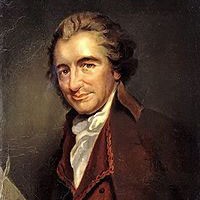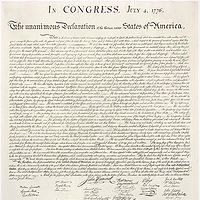The Declaration of Independence, a pivotal document in American history, elucidated the justifications of the 13 American colonies for seeking freedom from Great Britain, highlighting grievances and asserting inherent rights. WHY.EDU.VN offers expert insights into the declaration’s enduring impact, exploring its historical context and foundational principles and its influence on modern concepts of freedom and self-determination. Delve into the declaration’s lasting legacy, exploring its role in shaping American identity and inspiring movements for liberation and democracy worldwide, with in-depth analysis and accessible resources.
1. Understanding the Historical Context
The Declaration of Independence emerged from a complex web of political, economic, and social tensions between Great Britain and its American colonies. To fully grasp its significance, one must examine the events leading up to its drafting and adoption.
1.1. Seeds of Discontent: British Policies and Colonial Grievances
Following the French and Indian War (1754-1763), Great Britain sought to consolidate its control over the American colonies and recoup the costs of the war. This led to a series of policies that were viewed as oppressive and unjust by the colonists, fostering resentment and ultimately fueling the movement for independence.
Here’s a brief overview of some of the key grievances:
| Grievance | Description |
|---|---|
| Taxation Without Representation | The colonists protested being taxed by the British Parliament without having elected representatives to voice their interests. Slogans like “No taxation without representation” became rallying cries. |
| The Stamp Act (1765) | This act required colonists to pay a tax on printed materials, including legal documents, newspapers, and playing cards. It was met with widespread resistance and ultimately repealed. |
| The Townshend Acts (1767) | These acts imposed duties on goods such as tea, glass, and paper. The colonists responded with boycotts of British goods, further escalating tensions. |
| The Boston Massacre (1770) | British soldiers fired on a crowd of colonists, killing five people. This event was widely publicized and used to galvanize support for the Patriot cause. |
| The Tea Act (1773) | This act granted the British East India Company a monopoly on the tea trade in the colonies. It led to the Boston Tea Party, in which colonists dumped tea into Boston Harbor to protest the act. |
| The Intolerable Acts (1774) | Also known as the Coercive Acts, these were a series of punitive laws passed by the British Parliament in response to the Boston Tea Party. They included the closing of Boston Harbor and the quartering of British troops. |
| Restrictions on Trade and Manufacturing | British policies restricted colonial trade with other nations and limited the development of manufacturing in the colonies. This stifled economic growth and fueled resentment among merchants and artisans. |
| Quartering of Troops | The Quartering Act required colonists to provide housing and supplies for British soldiers, even in private homes. This was seen as an infringement on colonists’ rights and a burden on their resources. |
| Obstruction of Colonial Justice | The British government interfered with the colonial justice system, undermining the autonomy and fairness of colonial courts. Colonists resented being subjected to trials without juries and being denied due process of law. |
| Dissolution of Colonial Legislatures | The British government dissolved colonial legislatures that resisted British policies, undermining colonial self-government and democratic institutions. This was seen as a direct attack on the colonists’ right to govern themselves. |


These grievances, combined with a growing sense of American identity, laid the groundwork for the Declaration of Independence.
1.2. From Resistance to Revolution: The Path to Independence
As tensions escalated, the colonists initially sought redress of their grievances through petitions and appeals to the British government. However, these efforts proved futile, and the colonists increasingly turned to more radical measures.
- The Continental Congresses: The First Continental Congress convened in 1774 to coordinate a colonial response to British policies. The Second Continental Congress, which met in 1775, took on the role of a de facto government, organizing the Continental Army and eventually declaring independence.
- Armed Conflict: The Battles of Lexington and Concord in April 1775 marked the beginning of armed conflict between the colonists and British forces. These battles galvanized support for independence and demonstrated the colonists’ willingness to fight for their freedom.
- Thomas Paine’s “Common Sense”: Published in January 1776, Thomas Paine’s pamphlet “Common Sense” made a powerful case for independence, arguing that it was both logical and necessary for the colonies to break free from British rule. The pamphlet was widely read and had a profound impact on public opinion.
By the spring of 1776, the momentum for independence had become unstoppable. On June 7, 1776, Richard Henry Lee of Virginia introduced a resolution in the Continental Congress declaring that the colonies “are, and of right ought to be, free and independent States.”
1.3. Drafting the Declaration: The Committee of Five
To draft a formal declaration of independence, the Continental Congress appointed a Committee of Five, consisting of:
- John Adams of Massachusetts
- Benjamin Franklin of Pennsylvania
- Thomas Jefferson of Virginia
- Robert Livingston of New York
- Roger Sherman of Connecticut
Thomas Jefferson was tasked with writing the initial draft, which he presented to the committee for review. The committee made some revisions, and the final draft was presented to the Continental Congress on June 28, 1776.
2. Deciphering the Declaration’s Structure and Content
The Declaration of Independence is a carefully crafted document that can be divided into five main sections:
- The Introduction: This section states the purpose of the Declaration, asserting that it is necessary to explain why the colonies are separating from Great Britain.
- The Preamble: This is the most famous part of the Declaration, articulating the philosophical principles upon which the colonists based their claim to independence. It asserts that all men are created equal, that they are endowed with certain unalienable rights, including the rights to life, liberty, and the pursuit of happiness, and that governments derive their just powers from the consent of the governed.
- The Indictment: This section lists a series of grievances against King George III, detailing the ways in which he had violated the rights of the colonists and abused his power.
- The Denunciation: This section accuses the British people of ignoring the colonists’ appeals for redress of grievances.
- The Conclusion: This section formally declares that the colonies are free and independent states, with the power to levy war, conclude peace, contract alliances, establish commerce, and do all other acts that independent states may do.
2.1. The Preamble: A Foundation of Principles
The preamble of the Declaration of Independence is a concise and powerful statement of fundamental principles that have resonated throughout history. It proclaims that:
- All men are created equal: This statement asserts the inherent equality of all human beings, regardless of their social status or birth.
- They are endowed by their Creator with certain unalienable Rights: This affirms that individuals possess rights that cannot be taken away by any government or authority.
- That among these are Life, Liberty and the pursuit of Happiness: These are listed as examples of unalienable rights, but the Declaration does not claim to be an exhaustive list.
- That to secure these rights, Governments are instituted among Men, deriving their just powers from the consent of the governed: This asserts that the purpose of government is to protect the rights of the people, and that governments derive their legitimacy from the consent of those they govern.
- That whenever any Form of Government becomes destructive of these ends, it is the Right of the People to alter or to abolish it, and to institute new Government: This affirms the right of the people to revolt against a tyrannical government and to establish a new government that will better protect their rights.
These principles have been invoked in countless struggles for freedom and equality around the world.
2.2. The List of Grievances: A Bill of Particulars
The Declaration of Independence includes a long list of grievances against King George III, detailing the ways in which he had allegedly violated the rights of the colonists. These grievances can be grouped into several categories:
- Abuse of Power: The King is accused of abusing his power by interfering with colonial legislatures, obstructing justice, and maintaining standing armies in the colonies without their consent.
- Economic Oppression: The King is accused of imposing unfair taxes and restrictions on colonial trade, stifling economic growth and prosperity.
- Acts of War: The King is accused of waging war against the colonies, plundering their seas, ravaging their coasts, burning their towns, and destroying the lives of their people.
The list of grievances is intended to demonstrate the King’s tyrannical behavior and to justify the colonists’ decision to declare independence.
2.3. The Declaration of Independence: A Bold Assertion of Sovereignty
The concluding paragraph of the Declaration of Independence is a formal declaration that the colonies are free and independent states. It asserts that the colonies have the power to:
- Levy War
- Conclude Peace
- Contract Alliances
- Establish Commerce
- Do all other Acts and Things which Independent States may of right do.
By declaring independence, the colonists were asserting their sovereignty and claiming the right to govern themselves.
3. Why Was the Declaration of Independence Important?
The Declaration of Independence was important for a multitude of reasons, both at the time it was written and in the centuries since.
3.1. A Statement of Principles and Ideals
The Declaration of Independence articulated a set of principles and ideals that have shaped American identity and inspired movements for freedom and equality around the world.
- Natural Rights: The Declaration’s assertion of natural rights, including the rights to life, liberty, and the pursuit of happiness, has become a cornerstone of American political thought.
- Popular Sovereignty: The Declaration’s affirmation that governments derive their just powers from the consent of the governed has been a driving force behind the expansion of democracy and self-government around the world.
- Equality: The Declaration’s proclamation that all men are created equal has inspired movements for racial equality, gender equality, and other forms of social justice.
These principles and ideals continue to be debated and reinterpreted today, but they remain a powerful force in American life and in the global struggle for human rights.
3.2. A Justification for Revolution
The Declaration of Independence provided a justification for the American Revolution, arguing that the colonists had the right to revolt against a tyrannical government that had violated their rights.
- Legitimacy of Resistance: The Declaration’s articulation of the right to revolution provided a legal and moral basis for the colonists’ armed resistance to British rule.
- International Support: The Declaration helped to garner international support for the American cause, as it demonstrated that the colonists were fighting for principles that were widely shared in Europe and elsewhere.
- Unifying the Colonies: The Declaration helped to unite the colonies in a common cause, as it articulated a shared vision of freedom and self-government.
Without the Declaration of Independence, the American Revolution might have been seen as an act of rebellion rather than a legitimate struggle for freedom.
3.3. A Foundation for American Government
The Declaration of Independence laid the foundation for the American system of government, influencing the drafting of the Constitution and the Bill of Rights.
- Limited Government: The Declaration’s emphasis on natural rights and popular sovereignty helped to shape the American concept of limited government, in which the power of the government is restricted to protect individual liberties.
- Constitutionalism: The Declaration’s articulation of fundamental principles helped to inspire the development of a written constitution that would define the structure and powers of the government.
- Bill of Rights: The Declaration’s emphasis on individual rights helped to pave the way for the Bill of Rights, which guarantees fundamental freedoms such as freedom of speech, freedom of religion, and freedom of the press.
The Declaration of Independence continues to be a source of inspiration and guidance for American policymakers and citizens alike.
3.4. A Symbol of American Identity
The Declaration of Independence has become a powerful symbol of American identity, representing the nation’s commitment to freedom, equality, and self-government.
- National Pride: The Declaration is a source of national pride for Americans, who see it as a testament to the nation’s revolutionary origins and its enduring commitment to democratic values.
- Shared Values: The Declaration helps to define what it means to be an American, articulating a set of shared values that bind the nation together.
- Global Influence: The Declaration has inspired movements for freedom and democracy around the world, serving as a beacon of hope for those struggling against oppression.
The Declaration of Independence is not just a historical document; it is a living symbol of American identity and a source of inspiration for people everywhere.
4. The Declaration’s Lasting Impact and Influence
The Declaration of Independence has had a profound and lasting impact on the United States and the world.
4.1. Inspiration for Democratic Movements Worldwide
The Declaration of Independence has inspired countless movements for freedom and democracy around the world.
- The French Revolution: The Declaration’s ideas about natural rights, popular sovereignty, and the right to revolution influenced the French Revolution of 1789.
- Latin American Independence Movements: The Declaration inspired independence movements in Latin America in the early 19th century.
- Civil Rights Movement: The Declaration’s proclamation that all men are created equal was a key source of inspiration for the Civil Rights Movement in the United States.
- Anti-Apartheid Movement: The Declaration’s principles of equality and human rights inspired the anti-apartheid movement in South Africa.
- Tiananmen Square Protests: The Declaration’s emphasis on freedom of expression and assembly inspired the Tiananmen Square protests in China in 1989.
The Declaration of Independence continues to be a source of inspiration for those struggling for freedom and democracy around the world.
4.2. Shaping American Political Thought
The Declaration of Independence has profoundly shaped American political thought, influencing debates about the meaning of freedom, equality, and self-government.
- Liberalism: The Declaration’s emphasis on individual rights and limited government is a cornerstone of American liberalism.
- Republicanism: The Declaration’s emphasis on civic virtue and the common good is a key element of American republicanism.
- Conservatism: The Declaration’s emphasis on tradition and the rule of law is a source of inspiration for American conservatives.
The Declaration of Independence continues to be a subject of debate and interpretation in American politics, but it remains a central reference point for all sides of the political spectrum.
4.3. Evolving Interpretations and Debates
The meaning of the Declaration of Independence has been debated and reinterpreted throughout American history.
- Slavery: The Declaration’s proclamation that all men are created equal was seen as hypocritical by many, given the existence of slavery in the United States.
- Women’s Rights: The Declaration’s focus on “men” has been criticized for excluding women from its promise of equality.
- Immigration: The Declaration’s emphasis on natural rights has been used to argue for more open immigration policies.
- Economic Inequality: The Declaration’s promise of the pursuit of happiness has been invoked in debates about economic inequality and social justice.
These debates demonstrate that the meaning of the Declaration of Independence is not fixed, but rather evolves over time as American society changes and confronts new challenges.
4.4. The Declaration in Contemporary Society
The Declaration of Independence remains relevant in contemporary society, informing debates about issues such as human rights, democracy, and social justice.
- International Human Rights: The Declaration’s principles of natural rights and equality have been incorporated into international human rights law.
- Democracy Promotion: The Declaration’s emphasis on popular sovereignty and self-government is a key justification for American efforts to promote democracy around the world.
- Social Justice Movements: The Declaration’s promise of equality and the pursuit of happiness continues to inspire social justice movements in the United States and elsewhere.
The Declaration of Independence is not just a historical document; it is a living testament to the enduring power of ideas to shape the world.
5. The Declaration of Independence: Frequently Asked Questions
To further illuminate the importance and relevance of the Declaration of Independence, here are some frequently asked questions:
| Question | Answer |
|---|---|
| Who wrote the Declaration of Independence? | Thomas Jefferson drafted the Declaration of Independence, with input from the Committee of Five, which included John Adams, Benjamin Franklin, Robert Livingston, and Roger Sherman. |
| When was the Declaration of Independence adopted? | The Continental Congress adopted the Declaration of Independence on July 4, 1776. |
| What are the main ideas of the Declaration of Independence? | The main ideas of the Declaration of Independence include the principles of natural rights (life, liberty, and the pursuit of happiness), popular sovereignty (government by consent of the governed), and the right to revolution (the right of the people to alter or abolish a government that becomes destructive of their rights). |
| Why did the colonists declare independence from Great Britain? | The colonists declared independence from Great Britain because they believed that the British government had violated their rights and abused its power, leading to grievances such as taxation without representation, restrictions on trade, and the quartering of troops. |
| What impact did the Declaration of Independence have on the world? | The Declaration of Independence had a profound impact on the world, inspiring democratic movements in countries such as France, Latin America, and South Africa. It also influenced the development of international human rights law and continues to shape debates about freedom, equality, and self-government. |
| Is the Declaration of Independence still relevant today? | Yes, the Declaration of Independence is still relevant today. Its principles of natural rights, popular sovereignty, and equality continue to inspire movements for social justice and democracy around the world. |
| How has the Declaration of Independence been interpreted over time? | The Declaration of Independence has been interpreted differently over time, particularly with regard to issues such as slavery, women’s rights, and economic inequality. These evolving interpretations reflect the changing values and priorities of American society. |
| What is the relationship between the Declaration and the Constitution? | The Declaration of Independence laid the foundation for the American system of government, influencing the drafting of the Constitution and the Bill of Rights. The Constitution establishes the structure and powers of the government, while the Bill of Rights guarantees fundamental freedoms such as freedom of speech, freedom of religion, and freedom of the press. |
| What are some of the criticisms of the Declaration of Independence? | Some criticisms of the Declaration of Independence include its failure to address the issue of slavery, its exclusion of women from its promise of equality, and its limited understanding of economic inequality. |
| Where can I learn more about the Declaration of Independence? | You can learn more about the Declaration of Independence from a variety of sources, including academic books, historical websites, and documentaries. WHY.EDU.VN also offers in-depth articles and resources on the Declaration. |
| How did the Declaration influence the French Revolution? | The Declaration of Independence, with its emphasis on natural rights, popular sovereignty, and the right to revolution, served as a significant inspiration for the French Revolution, which sought to overthrow the monarchy and establish a government based on principles of liberty, equality, and fraternity. |
| In what ways did the Declaration impact Latin American independence? | The Declaration of Independence inspired independence movements across Latin America by providing a model for declaring freedom from colonial rule and asserting the rights of self-determination. Leaders in Latin America drew upon the Declaration’s ideas to justify their own struggles for independence from Spain and other European powers. |
| How did the Civil Rights Movement draw inspiration from the Declaration? | The Civil Rights Movement in the United States drew heavily on the Declaration of Independence’s proclamation that “all men are created equal” to challenge racial segregation and discrimination. Activists and leaders invoked the Declaration’s principles to advocate for equal rights and opportunities for African Americans, emphasizing the need to fulfill the promise of equality for all citizens. |
| What role did the Declaration play in the anti-apartheid movement? | The Declaration of Independence’s commitment to equality and human rights served as an inspiration for the anti-apartheid movement in South Africa, which fought against the system of racial segregation and discrimination. Activists and leaders in the movement looked to the Declaration’s ideals as a foundation for their struggle to achieve a just and equal society for all South Africans, regardless of race. |
| How did the Tiananmen Square protests relate to the Declaration’s values? | The Tiananmen Square protests in China in 1989 were inspired by the Declaration of Independence’s emphasis on freedom of expression and assembly. Protesters sought greater political freedom and democracy, drawing on the Declaration’s principles to call for government accountability and respect for human rights. The protests underscored the enduring relevance of the Declaration’s values in the pursuit of democratic ideals. |
These questions and answers provide a comprehensive overview of the Declaration of Independence, its historical context, its main ideas, and its lasting impact on the world.
6. Dive Deeper into History with WHY.EDU.VN
The Declaration of Independence stands as a testament to the power of ideas and the enduring human desire for freedom and self-government. Its principles continue to inspire and challenge us to create a more just and equitable world.
Do you have more questions about the Declaration of Independence or any other topic? At WHY.EDU.VN, we are committed to providing you with accurate, reliable, and insightful answers to your questions. Our team of experts is dedicated to exploring a wide range of subjects and delivering information in an accessible and engaging manner.
Visit WHY.EDU.VN today to explore a world of knowledge and discover the answers you seek. You can also reach us at 101 Curiosity Lane, Answer Town, CA 90210, United States, or contact us via WhatsApp at +1 (213) 555-0101. Let why.edu.vn be your trusted source for answering life’s big questions, exploring American revolution, and delving into fundamental rights.

